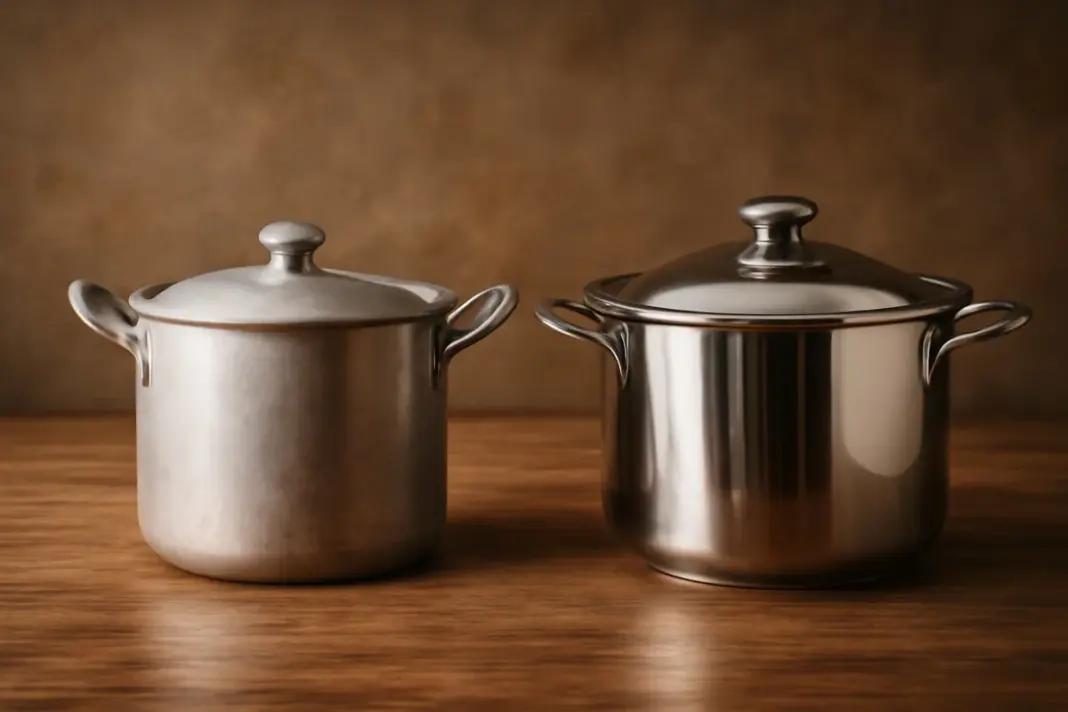A pot of curry bubbling away in shiny aluminium might look harmless, but looks can deceive. Cooking in aluminium utensils vs stainless steel cookware isn’t just a kitchen choice; it’s a silent health debate every home ignores.
The aroma may stay the same, but your body surely feels the difference. As experts start warning, the question grows louder: What’s truly safer for your stove and your health?
Cooking In Aluminium Utensils Vs Stainless Steel: Key Differences Explained
Indian households often face a dilemma: cooking in aluminium utensils vs stainless steel cookware. Dietician Shreya Goel says common kitchen mistakes must be avoided, especially the unnoticed habit of using aluminium pots. She highlights how this metal reacts with ingredients, secretly affecting health.
Aluminium utensils may seem lightweight and affordable, but stainless steel cookware benefits far surpass them when safety and durability matter most. Experts point out that choosing the best cookware material for health helps reduce risks linked to metals leaching into food. It’s time to rethink tradition and prioritise what truly preserves your well-being.
DON'T MISS
Hidden Disadvantages of Aluminium Utensils Every Cook Should Know
Aluminium’s shine hides its dangers, warns dietician Shreya Goel, marking the serious disadvantages of aluminium utensils to be aware of.
- Metal leaching: Aluminium reacts with acidic dishes and releases harmful elements into every meal.
- Spikes blood sugar: Studies reveal aluminium exposure worsens insulin resistance, raising the risk of diabetes.
- Brain & bone health: Long-term use links to weak bones, memory loss, and kidney strain.
- Children at risk: Prolonged exposure may impair brain development and learning.
The health risks are clear, leading experts to explore safer, more dependable alternatives in the kitchen.
Major Health and Durability Benefits of Using Stainless Steel
Every cook wants reliability, safety, and purity while preparing meals. Dietician Shreya Goel notes that switching to safe cooking means choosing stainless steel.
- Food-grade protection: Goel recommends 304 (18/8) grade stainless steel cookware for non-reactive and stable cooking.
- Nutrient retention: It preserves food’s natural nutrition while resisting rust and corrosion.
- Cooking versatility: Suitable for all recipes, from dals to sautes, without leaving metallic residues.
- Other safe materials: Experts also suggest cast iron, bronze (kansa), clay, and glass pans as alternatives.
These stainless steel cookware benefits proudly balance taste, safety, and longevity for modern kitchens.
Why Experts Recommend Choosing Quality Stainless Steel Cookware?
Experts comparing cooking in aluminium utensils vs stainless steel cookware agree that quality steel ensures the best cookware material for health. Aluminium utensils’ disadvantages include metal absorption and possible toxicity over time. Stainless steel cookware benefits reflect purity and resilience, making it ideal for daily use.
It distributes heat evenly and lasts longer, which reduces waste and expense. Meanwhile, aluminium degrades faster and alters food texture during cooking. For those seeking safer kitchens and smarter cooking, stainless steel becomes more than a trend; it’s a mindful investment aligning taste with long-term well-being.
Cooking in aluminium utensils vs stainless steel cookware decides more than taste, it shapes your health. Choosing stainless steel, the best cookware material for health, ensures lasting safety and purity.
Disclaimer: This content, including advice, provides general information only. It is not a substitute for a qualified medical opinion in any way. The methods and claims mentioned in this article should be considered as suggestions only; DNP India neither confirms nor denies them. Always consult a doctor before following any such suggestions/treatments/medications/diets.



